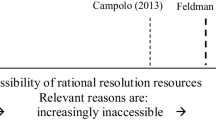Abstract
Argument is a pervasive feature of human interaction, and in its natural contexts of occurrence, it is organized around the management of disagreement. Since disagreement can occur around any kind of speech act whatsoever, not all arguments involve a claim supported by reasons; many involve standpoints attributed to someone but claimed by no one. And although truth and validity are often at issue in naturally occurring arguments, these do not exhaust the standards to which arguers are held. Arguers hold one another accountable for cooperating in the management of disagreement, infusing argumentation with a natural normativity that exists apart from any theorized appraisal standard applied to the claim-reason relationship. Argumentation’s natural normativity is visible not only in how arguments unfold in interaction but also in how humanity continuously strives to improve its methods of disagreement management.


Similar content being viewed by others
Notes
Examples in this paper were prepared for analysis by reconciling several published transcripts and correcting the result by comparison with multiple published videorecordings (seven in all; different videorecordings made different parts of the interaction audible). The correction process also added details such as placement of overlapped speech, and, whenever possible, identification of individual reporters so that multiple questions by the same reporter could be linked. Only selected segments of the interaction are used here; a complete videotape and transcript is available from the New York Times at https://www.nytimes.com/2017/08/15/us/politics/trump-press-conference-transcript.html (permalink https://nyti.ms/2uZQGj0).
Videotape is available at https://www.c-span.org/video/?432523-1/president-trump-condemns-violence-charlottesville-va; transcription has been corrected from c-span’s closed captioning.
A detailed summary of the events was published by the New York Times on August 16, 2017: “Inside the C.E.O. Rebellion Against Trump’s Advisory Councils,” by David Gelles, Langdon Thomas, Jr., Andrew Ross Sorkin, and Kate Kelly (permalink https://nyti.ms/2vEcpAL).
News and opinion journalism in the latter half of August 2017 contained repeated mentions of President Trump’s absent or unconvincing condemnations of the far right protestors. On August 23, 2017, the New York Times summarized much of the domestic and international criticism, and reported that a United Nations panel had joined the criticism of President Trump: “U.N. Panel Condemns Trump’s Response to Charlottesville Violence,” by Sewell Chan and Nick Cumming-Bruce (permalink https://nyti.ms/2vo1aZO).
Remarks made at a National Academy of Science Workshop, “Autism and the Environment: Challenges and Opportunities for Research,” held Apr. 18-19, 2007, in Washington DC. Edited proceedings of the workshop have been published and are available at http://www.nap.edu/catalog/11946.html.
References
Aakhus M, Muresan S, Wacholder N (2017) An argument-ontology for a response-centered approach to argumentation mining. In: Bex F, Grasso F, Green N (eds) Proceedings of the 16th Workshop on Computational Models of Natural Argument (CMNA 2016), New York, USA, 9 July 2016. Online:http://ceur-ws.org/Vol-1876/
Goody J (1975) Literacy in traditional societies. Cambridge University Press, Cambridge
Hepburn A, Bolden GB (2013) The conversation analytic approach to transcription. In: Sidnell J, Stivers T (eds) The handbook of conversation analysis. Wiley-Blackwell, Chichester, pp 57–76
Jackson S (1992) “Virtual standpoints” and the pragmatics of conversational argument. In: van Eemeren FH, Grootendorst R, Blair JA, Willard CA (eds) Argument illuminated. International Centre for the Study of Argumentation, Amsterdam, pp. 260–226
Jackson S (2015) Design thinking in argumentation theory and practice. Argumentation. https://doi.org/10.1007/s10503-015-9353-7
Jackson S, Jacobs S (1980) Structure of conversational argument: pragmatic bases for the enthymeme. Q J Speech. https://doi.org/10.1080/00335638009383524
Jackson S, Schneider J (2017) Cochrane review as a “warranting device” for reasoning about health. Argumentation. https://doi.org/10.1007/s10503-017-9440-z
Jacobs S, Jackson S (1982) Conversational argument: a discourse analytic approach. In: Cox JR, Willard CA (eds) Advances in argumentation theory and research. Southern Illinois University Press, Carbondale and Edwardsville, pp 205–237
Jacobs S, Jackson S (1989) Building a model of conversational argument. In: Dervin B, Grossberg L, O’Keefe BJ, Wartella E (eds) Rethinking communication: paradigm exemplars. Sage, Beverly Hills, pp 153–171
Johnson RH (2000) Manifest rationality: a pragmatic theory of argument. Erlbaum, Mahwah NJ
Mill JS (1895) A system of logic, rationative and inductive, 8th edn. Harper & Brothers, New York
Sacks H (1995) Lectures on conversation. Blackwell, Oxford UK
Sacks H, Schegloff EA, Jefferson G (1974) A simplest systematics for the organization of turn-taking for conversation. Language. https://doi.org/10.2307/412243
Toulmin SE (1958) The uses of argument. Cambridge University Press, London
van Eemeren FH, Grootendorst R, Jackson S, Jacobs S (1993) Reconstructing argumentative discourse. University of Alabama Press, Tuscaloosa
van Eemeren FH, Garssen B, Krabbe ECW, Snoeck Henkemans AF, Verheij B, Wagemans JHM (2014) Handbook of argumentation theory. Springer, Dordrecht
Acknowledgements
Zhang Xiaoqi and Curtis Jackson-Jacobs provided invaluable assistance in preparing the transcripts shown in Exhibits 1–3, as well as helpful suggestions on the analysis. Special thanks are due to Scott Jacobs for repeated close readings of this paper and for the prior collaborative work that is fundamental to the arguments made here.
Author information
Authors and Affiliations
Corresponding author
Rights and permissions
About this article
Cite this article
Jackson, S. Reason-Giving and the Natural Normativity of Argumentation. Topoi 38, 631–643 (2019). https://doi.org/10.1007/s11245-018-9553-5
Published:
Issue Date:
DOI: https://doi.org/10.1007/s11245-018-9553-5




